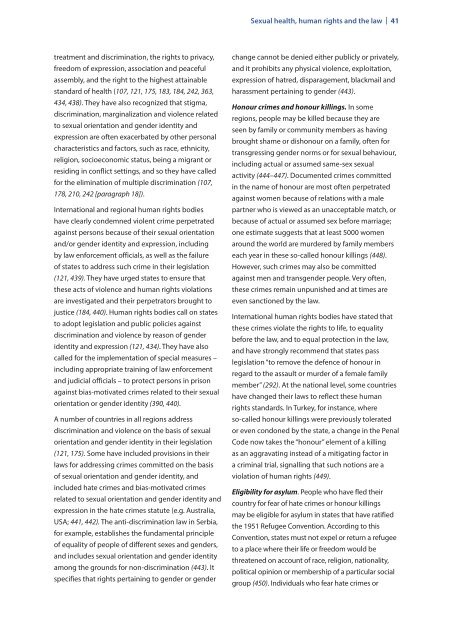Sexual health human rights and the law
1XoaDvM
1XoaDvM
You also want an ePaper? Increase the reach of your titles
YUMPU automatically turns print PDFs into web optimized ePapers that Google loves.
<strong>Sexual</strong> <strong>health</strong>, <strong>human</strong> <strong>rights</strong> <strong>and</strong> <strong>the</strong> <strong>law</strong> | 41<br />
treatment <strong>and</strong> discrimination, <strong>the</strong> <strong>rights</strong> to privacy,<br />
freedom of expression, association <strong>and</strong> peaceful<br />
assembly, <strong>and</strong> <strong>the</strong> right to <strong>the</strong> highest attainable<br />
st<strong>and</strong>ard of <strong>health</strong> (107, 121, 175, 183, 184, 242, 363,<br />
434, 438). They have also recognized that stigma,<br />
discrimination, marginalization <strong>and</strong> violence related<br />
to sexual orientation <strong>and</strong> gender identity <strong>and</strong><br />
expression are often exacerbated by o<strong>the</strong>r personal<br />
characteristics <strong>and</strong> factors, such as race, ethnicity,<br />
religion, socioeconomic status, being a migrant or<br />
residing in conflict settings, <strong>and</strong> so <strong>the</strong>y have called<br />
for <strong>the</strong> elimination of multiple discrimination (107,<br />
178, 210, 242 [paragraph 18]).<br />
International <strong>and</strong> regional <strong>human</strong> <strong>rights</strong> bodies<br />
have clearly condemned violent crime perpetrated<br />
against persons because of <strong>the</strong>ir sexual orientation<br />
<strong>and</strong>/or gender identity <strong>and</strong> expression, including<br />
by <strong>law</strong> enforcement officials, as well as <strong>the</strong> failure<br />
of states to address such crime in <strong>the</strong>ir legislation<br />
(121, 439). They have urged states to ensure that<br />
<strong>the</strong>se acts of violence <strong>and</strong> <strong>human</strong> <strong>rights</strong> violations<br />
are investigated <strong>and</strong> <strong>the</strong>ir perpetrators brought to<br />
justice (184, 440). Human <strong>rights</strong> bodies call on states<br />
to adopt legislation <strong>and</strong> public policies against<br />
discrimination <strong>and</strong> violence by reason of gender<br />
identity <strong>and</strong> expression (121, 434). They have also<br />
called for <strong>the</strong> implementation of special measures –<br />
including appropriate training of <strong>law</strong> enforcement<br />
<strong>and</strong> judicial officials – to protect persons in prison<br />
against bias-motivated crimes related to <strong>the</strong>ir sexual<br />
orientation or gender identity (390, 440).<br />
A number of countries in all regions address<br />
discrimination <strong>and</strong> violence on <strong>the</strong> basis of sexual<br />
orientation <strong>and</strong> gender identity in <strong>the</strong>ir legislation<br />
(121, 175). Some have included provisions in <strong>the</strong>ir<br />
<strong>law</strong>s for addressing crimes committed on <strong>the</strong> basis<br />
of sexual orientation <strong>and</strong> gender identity, <strong>and</strong><br />
included hate crimes <strong>and</strong> bias-motivated crimes<br />
related to sexual orientation <strong>and</strong> gender identity <strong>and</strong><br />
expression in <strong>the</strong> hate crimes statute (e.g. Australia,<br />
USA; 441, 442). The anti-discrimination <strong>law</strong> in Serbia,<br />
for example, establishes <strong>the</strong> fundamental principle<br />
of equality of people of different sexes <strong>and</strong> genders,<br />
<strong>and</strong> includes sexual orientation <strong>and</strong> gender identity<br />
among <strong>the</strong> grounds for non-discrimination (443). It<br />
specifies that <strong>rights</strong> pertaining to gender or gender<br />
change cannot be denied ei<strong>the</strong>r publicly or privately,<br />
<strong>and</strong> it prohibits any physical violence, exploitation,<br />
expression of hatred, disparagement, blackmail <strong>and</strong><br />
harassment pertaining to gender (443).<br />
Honour crimes <strong>and</strong> honour killings. In some<br />
regions, people may be killed because <strong>the</strong>y are<br />
seen by family or community members as having<br />
brought shame or dishonour on a family, often for<br />
transgressing gender norms or for sexual behaviour,<br />
including actual or assumed same-sex sexual<br />
activity (444–447). Documented crimes committed<br />
in <strong>the</strong> name of honour are most often perpetrated<br />
against women because of relations with a male<br />
partner who is viewed as an unacceptable match, or<br />
because of actual or assumed sex before marriage;<br />
one estimate suggests that at least 5000 women<br />
around <strong>the</strong> world are murdered by family members<br />
each year in <strong>the</strong>se so-called honour killings (448).<br />
However, such crimes may also be committed<br />
against men <strong>and</strong> transgender people. Very often,<br />
<strong>the</strong>se crimes remain unpunished <strong>and</strong> at times are<br />
even sanctioned by <strong>the</strong> <strong>law</strong>.<br />
International <strong>human</strong> <strong>rights</strong> bodies have stated that<br />
<strong>the</strong>se crimes violate <strong>the</strong> <strong>rights</strong> to life, to equality<br />
before <strong>the</strong> <strong>law</strong>, <strong>and</strong> to equal protection in <strong>the</strong> <strong>law</strong>,<br />
<strong>and</strong> have strongly recommend that states pass<br />
legislation “to remove <strong>the</strong> defence of honour in<br />
regard to <strong>the</strong> assault or murder of a female family<br />
member” (292). At <strong>the</strong> national level, some countries<br />
have changed <strong>the</strong>ir <strong>law</strong>s to reflect <strong>the</strong>se <strong>human</strong><br />
<strong>rights</strong> st<strong>and</strong>ards. In Turkey, for instance, where<br />
so-called honour killings were previously tolerated<br />
or even condoned by <strong>the</strong> state, a change in <strong>the</strong> Penal<br />
Code now takes <strong>the</strong> “honour” element of a killing<br />
as an aggravating instead of a mitigating factor in<br />
a criminal trial, signalling that such notions are a<br />
violation of <strong>human</strong> <strong>rights</strong> (449).<br />
Eligibility for asylum. People who have fled <strong>the</strong>ir<br />
country for fear of hate crimes or honour killings<br />
may be eligible for asylum in states that have ratified<br />
<strong>the</strong> 1951 Refugee Convention. According to this<br />
Convention, states must not expel or return a refugee<br />
to a place where <strong>the</strong>ir life or freedom would be<br />
threatened on account of race, religion, nationality,<br />
political opinion or membership of a particular social<br />
group (450). Individuals who fear hate crimes or


